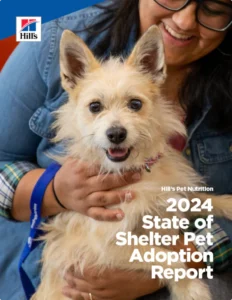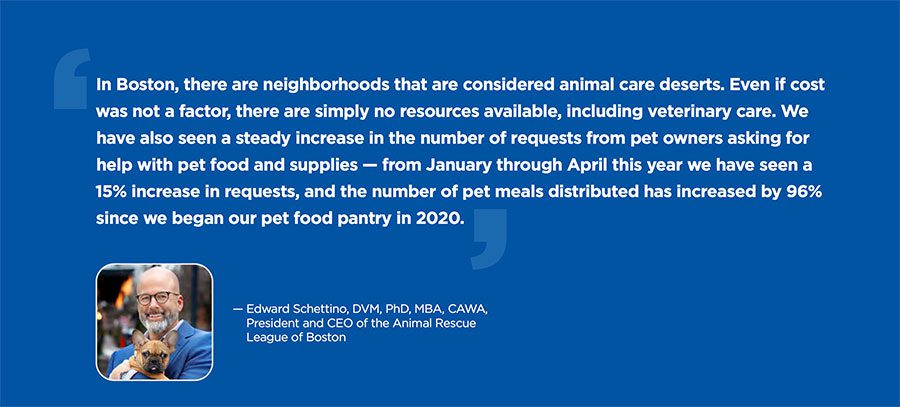ARL Featured in Hill’s Pet Nutrition 2024 State of Shelter Pet Adoption Report
The Animal Rescue League of Boston (ARL) announces its participation in the newly released 2024 Hill’s State of Shelter Pet Adoption Report. This data-rich report, released annually, highlights key leaders in the animal welfare industry and provides new insights around consumer attitudes and perceptions toward shelters and the animals in their care.
 For the report, Hill’s Pet Nutrition, a leading partner in animal welfare, surveyed a socioeconomically diverse group of 2,500 current and prospective pet owners to better understand what’s driving the increase in shelter pets and decrease in pet adoption rates. Alongside the new findings, the 2024 Hill’s Pet Nutrition State of Shelter Pet Adoption Report highlights ARL President and CEO, Dr. Edward Schettino.
For the report, Hill’s Pet Nutrition, a leading partner in animal welfare, surveyed a socioeconomically diverse group of 2,500 current and prospective pet owners to better understand what’s driving the increase in shelter pets and decrease in pet adoption rates. Alongside the new findings, the 2024 Hill’s Pet Nutrition State of Shelter Pet Adoption Report highlights ARL President and CEO, Dr. Edward Schettino.
“The Animal Rescue League of Boston is proud to be featured in the 2024 Hill’s State of Shelter Pet Adoption Report. The report sheds new light on adoption barriers that individuals in our community face every day,” said Dr. Edward Schettino, ARL President and CEO. “The data allows us to better understand what pet parents need to make adoption more accessible. As a result, we’re able to better serve our communities and the animals in our care.”
ARL partners with Hill’s Pet Nutrition’s Food, Shelter and Love program to feed the animals in its care. Every animal cared for receives daily, high-quality nutrition to be happy, healthy and more adoptable.
“Collaborating with animal shelters to help end pet homelessness is crucial,” said Dr. Karen Shenoy, US Chief Veterinary Officer at Hill’s Pet Nutrition. “One way we do that is by supplying shelters with quality nutrition to help shelter pets be healthy, happy and more adoptable. Since 2002, the Hill’s Food, Shelter & Love program has provided over $300 million worth of Hill’s brand pet foods to over 1,000 animal shelters, while also providing adoption kits to new pet parents.”

Key Findings
The following key findings from the 2024 Hill’s State of Shelter Pet Adoption Report will support ARL and others like it in creating even more meaningful, data-driven strategies for removing barriers to pet adoption and care.
Overall, Americans are open to adopting shelter pets, and younger generations are even more likely to adopt:
-
- 66% of people are likely to adopt shelter pets
-
- Of Gen Z and Millennials who’ve adopted a shelter pet before, 90% and 94% respectively are likely to adopt again
-
- Of Gen Z and Millennials who’ve never adopted a shelter pet, 75% and 77% respectively are likely to adopt
Pet adoption is less accessible for people making less than $75,000, with overall concerns about the cost of pet ownership being a top barrier to adoption:
-
- 84% of respondents said veterinary care is the most expensive part of owning a pet
-
- Those making less than $75,000 are more likely to surrender a pet due to financial difficulties and are more likely to say the cost of pet ownership exceeded their expectations
-
- Those making less than $50,000 are more likely to have experienced at least one pet-related housing restriction and are more likely to say the cost of veterinary care impacts their decision to adopt
Respondents report being less likely to adopt large dogs than cats or small- to medium-sized dogs, which are believed to be easier and less expensive to manage:
-
- Fewer than 1 in 4 respondents report being likely to adopt a large dog:
-
- 46% are likely to adopt a small dog
-
- 45% are likely to adopt a medium dog
-
- 39% are likely to adopt a cat
-
- 24% are likely to adopt a large dog
-
- More than half of respondents who prefer a small or medium dog selected personal preference as the top reason; however, they also chose additional factors that deter them from adopting a large dog:
-
- 27% say it’s difficult to travel with large breed dogs
-
- 26% say their housing doesn’t allow large breed dogs
-
- 25% say large breed dogs take up too much space
While survey respondents view fostering favorably, misperceptions about the costs and a fear of adopting the fostered pet may be limiting broader participation:
-
- 40% of prospective fosters are afraid of adopting their foster pet (there is no expectation for fosterers to adopt)
-
- 64% of prospective fosters say that if pet care costs were covered during the experience, they’d be likely to foster (fostering usually requires minimal financial investment, with many shelters providing the fosterer with all necessary supplies, including pet food)
Offering pet parents post-adoption support, especially behavior services, is a powerful tool to keeping more pets with their families:
-
- Respondents rated post-adoption behavioral services more likely to positively influence adoption (34%) than pre-adoption behavioral services (30%)
-
- Of respondents who experienced post-adoption anxiety, 46% said behavioral issues were the top driving force
-
- Of individuals who had relinquished a pet, 24% said behavioral/training issues were the top reason for surrendering
-
- 94% of pet owners considering relinquishment kept their pet after receiving support
“Although the Hill’s State of Shelter Pet Adoption Report identifies genuine and concerning barriers, the hope is that it serves as a springboard for opportunity,” Dr. Shenoy said. “By working hand-in-hand with individuals and organizations in the animal welfare community, the data will guide us toward meaningful initiatives that will help more shelter pets find loving families.”
More information about ARL’s feature in the 2024 Hill’s Pet Nutrition State of Shelter Pet Adoption Report.

